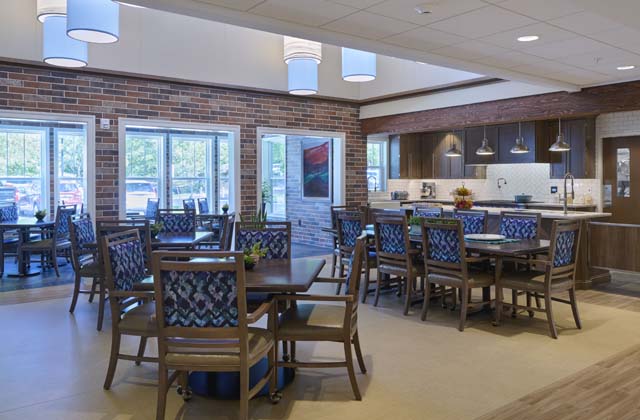Personalized Memory Care Options Focused on Individual Needs
Personalized Memory Care Options Focused on Individual Needs
Blog Article
All Concerning Memory Treatment Solutions: Why Little Memory Care Homes Are an Excellent Choice
Memory care solutions play an important role in sustaining individuals with Alzheimer's and dementia. Small memory treatment homes stick out for their personalized approach and intimate setup. With reduced staff-to-resident ratios, these homes cultivate more powerful connections and customized treatment. Locals take advantage of improved social communications and a secure environment. As households check out choices, understanding the unique benefits of tiny memory care homes becomes essential. What elements should be considered when choosing the right home?
Comprehending Memory Care Services
While many might know with basic elderly care options, understanding memory care solutions is essential for family members encountering the obstacles of cognitive decrease. Memory treatment especially caters to individuals with conditions such as Alzheimer's condition and other kinds of mental deterioration. These solutions provide a structured atmosphere that concentrates on enhancing the top quality of life for citizens through specialized care and support.Memory treatment facilities are designed to guarantee safety and security and safety and security, often including protected settings to stop roaming. Educated employee are available all the time to help with everyday tasks, drug monitoring, and personal treatment. Furthermore, memory care programs commonly consist of cognitive excitement activities, tailored to engage homeowners and promote mental wellness. Family members can take advantage of understanding these solutions, as they allow notified choices regarding their liked ones' treatment, making sure that their certain demands and preferences are addressed in a helpful and caring fashion.
The Benefits of Tiny Memory Treatment Residences
Tiny memory care homes offer unique benefits that can greatly enhance the lifestyle for residents with cognitive impairments. One considerable advantage is the intimate setting, which enables for individualized communications among staff and homeowners. This smaller sized setup cultivates purposeful partnerships, minimizing sensations of isolation and anxiety often experienced by individuals with memory issues.Additionally, the lower staff-to-resident proportion in little memory care homes allows caregivers to offer more attentive supervision and support. This method not only improves safety and security however also promotes a sense of protection for the residents.Moreover, small memory treatment homes can adjust swiftly to the one-of-a-kind requirements and preferences of each homeowner, allowing for a much more homey ambience. Such an environment can urge social engagement and engagement in tasks, inevitably improving the everyday experiences of those living with cognitive disabilities.
Personalized Care Plans for Residents
Individualized treatment strategies are vital in memory care homes, as they provide to the special demands and preferences of each local. These plans begin with comprehensive analyses performed by knowledgeable specialists, who evaluate cognitive capacities, case history, and individual rate of interests. This tailored method assurances that care is not just reliable but also considerate of each person's self-respect and autonomy.Moreover, individualized care plans are flexible, allowing modifications as locals' needs progress in time. This versatility fosters a complacency and familiarity, which is necessary for individuals dealing with memory challenges. Caregivers are educated to apply these plans consistently, providing assistance that lines up with the citizens' regimens and preferences.Ultimately, individualized treatment plans boost the quality of life for citizens by advertising well-being, engagement, and independence, making them a fundamental aspect of memory treatment services in small memory treatment homes.
Creating a Home-Like Setting
Creating a home-like atmosphere is vital for promoting convenience and knowledge in memory treatment settings, as it greatly influences homeowners' psychological wellness. Small memory care homes frequently prioritize customized touches, such as cozy color palettes, family members pictures, and acquainted furnishings plans, which assist residents feel a lot more comfortable. Integrating aspects evocative a typical home, like comfy space and public locations, encourages a feeling of belonging.Moreover, using all-natural light and outdoor spaces can enhance the ambience, advertising relaxation and peace. Team member play a considerable duty in maintaining this setting by involving with citizens in a compassionate fashion, treating them like family members. Regular activities, such as food preparation or horticulture, can additionally add to a home-like feel, using chances for locals to take part in meaningful experiences. In general, creating a nurturing setting sustains cognitive feature and psychological security, making it a vital facet of memory treatment services.
Enhanced Social Interaction and Neighborhood
Boosted social interaction and neighborhood are important parts of memory care solutions. By promoting personalized social involvement and creating a family-like ambience, these solutions promote meaningful connections amongst locals. Group occasions and activities better motivate involvement, assisting people really feel a lot more consisted of and sustained.
Individualized Social Interaction
While social communication is important for overall health, many individuals with memory impairments commonly have a hard time to involve meaningfully with others. Personalized social involvement in memory treatment homes addresses this obstacle by producing customized tasks that accommodate locals' unique rate of interests and capacities. By concentrating on private choices, caregivers can promote connections that resonate deeply with each person. Activities such as art treatment, music sessions, and assisted conversations advertise cognitive excitement and emotional expression. Furthermore, small team setups motivate friendship and enable more intimate interactions, improving sensations of belonging. This strategy not only combats feelings of isolation however likewise encourages locals to keep a feeling of identification, ultimately adding my site to improved mental wellness and high quality of life.
Family-like Atmosphere
In a memory treatment setup, promoting a family-like environment substantially improves social communication and builds a sense of community among locals. Smaller sized memory treatment homes typically prioritize intimate settings, allowing citizens to create closer links with one another and team member. This nurturing atmosphere promotes count on, which is necessary for people with memory disabilities. Citizens are more most likely to engage in discussions and share experiences, creating a supportive network that eases feelings of solitude. The familiarity of common spaces and routines contributes to a feeling of belonging, better motivating social interaction (personalized memory care). In such setups, emotional bonds thrive, resulting in enhanced overall well-being and a better of life for homeowners as they browse their everyday experiences together
Group Activities and Occasions

Security and Security Features in Little Residences
Lots of tiny homes created for memory treatment integrate essential safety and security and protection attributes to ensure the well-being of homeowners. These homes frequently make use of protected entry Recommended Site and departure indicate protect against wandering, a typical worry amongst people with memory disabilities. In addition, security systems and alarm mechanisms improve surveillance, ensuring that team can promptly respond to any kind of unusual activities.Interior formats are customized for safety, with minimized threats such as sharp edges and clutter-free pathways. Handrails and non-slip floor covering are generally set up to reduce the danger of falls. Employee are educated in emergency situation procedures, ensuring they are gotten ready for various situations.Moreover, customized care plans may include analysis of individual security requirements, giving customized services for each local. In general, these safety and security and protection attributes produce a caring atmosphere where locals can grow while preserving their dignity and freedom.
Just how to Pick the Right Memory Treatment Home
Just how can families ensure they choose the most suitable memory care home for their liked ones? The decision calls for careful consideration of numerous elements. Families should review the center's team qualifications and training, making certain that caretakers are experienced in taking care of memory-related problems. Next off, it's essential to examine the home's setting, concentrating on safety and security functions and whether it fosters a sense of area and belonging. Visiting the facility can supply understanding right into day-to-day tasks and the social ambience, which are crucial for mental stimulation and emotional wellness. Additionally, households must inquire concerning the treatment strategies provided, ensuring they are customized to specific requirements. Finally, thinking about the home's place and ease of access for family members check outs can add to a smoother change. By resolving these elements, families can make an educated choice that prioritizes their enjoyed one's convenience and high quality of life in a memory care setting.
Frequently Asked Inquiries
What Credentials Should Staff Members in Memory Treatment Homes Have?
Team member in memory treatment homes ought to have pertinent visit accreditations, experience in mental deterioration care, solid communication abilities, and compassion. Ongoing training in behavioral administration and therapeutic interventions improves their capability to sustain homeowners properly.
How Do Memory Care Services Differ From Standard Assisted Living?
Memory treatment services focus especially on individuals with memory problems, giving specialized support and organized atmospheres. On the other hand, typical assisted living provides basic help with daily activities, lacking the tailored technique needed for those with cognitive challenges.
What Kinds of Tasks Are Offered in Memory Treatment Residences?
Memory treatment homes commonly supply a selection of tasks made to engage residents. Typical choices include art treatment, songs sessions, cognitive games, physical exercises, gardening, and social events, all targeted at improving wellness and cognitive feature.
Can Locals Bring Their Own Valuables to Memory Treatment Homes?
Homeowners can normally bring their own belongings to memory treatment homes, enabling them to personalize their home - personalized memory care. This method helps develop a familiar environment, advertising comfort and a sense of identification for the people

Exactly How Are Member Of The Family Associated With the Care Process?
Member of the family play a crucial function in the treatment process, frequently getting involved in decision-making, attending care conferences, and offering psychological support. Their participation promotes a collaborative environment, improving the citizen's total wellness and top quality of life. While lots of might be familiar with general senior treatment choices, comprehending memory treatment services is crucial for families dealing with the obstacles of cognitive decline. These services supply a structured atmosphere that focuses on improving the quality of life for homeowners through specialized treatment and support.Memory treatment facilities are designed to assure security and security, commonly featuring secured environments to avoid wandering. Personalized treatment plans are crucial in memory treatment homes, as they provide to the distinct demands and choices of each resident. Team members in memory care homes must possess appropriate qualifications, experience in mental deterioration care, solid communication skills, and concern. Memory care services focus especially on people with memory problems, supplying specialized assistance and structured atmospheres.
Report this page